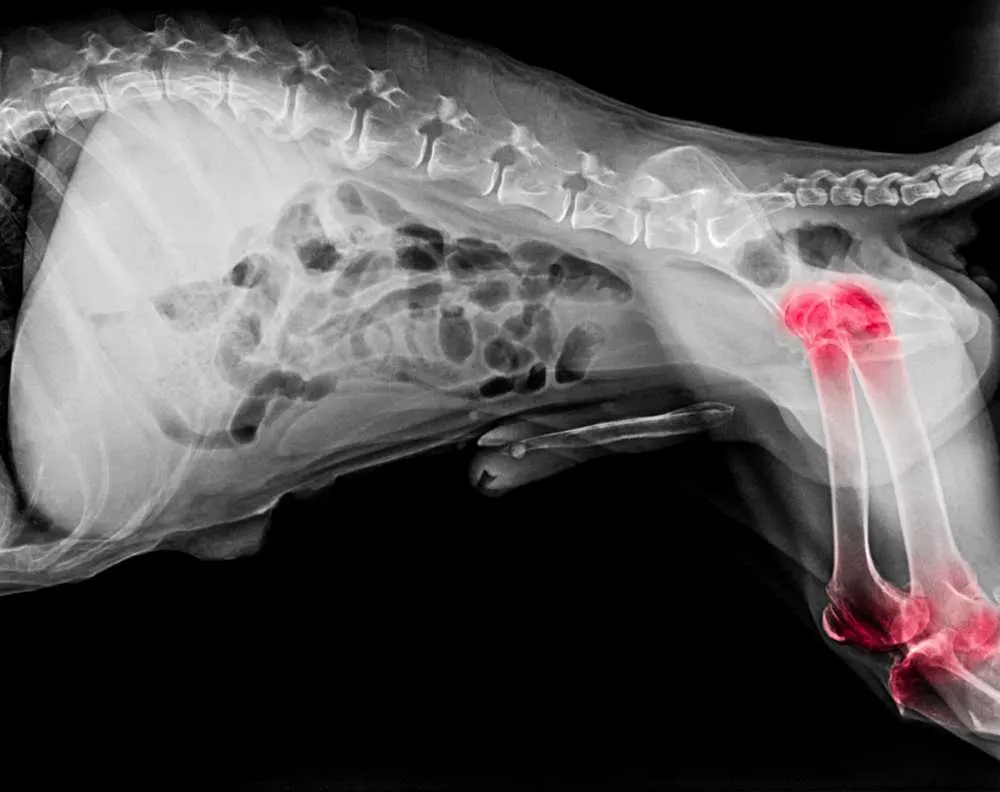When you think about it, owning a pet is really not that different from raising a human being. It brings all the same joy, but it comes with similar hardships and a tremendous responsibility.
Of course, making sure that our favorite pets are in good health and relieved of pain has to be one of the biggest concerns one pet owner can ever face.
This fact comes especially true in the case of our favorite corgis that are already somewhat challenging to raise compared to some other dog breeds.
For instance, corgis are very active, and they need a lot of exercise in order to thrive. If they are deprived of this increased activity, they can quickly become obese and face serious problems.
That is the reason why common bone disorders like arthritis are especially dangerous to this small and exceptionally intelligent dog breed.
Arthritis can not only limit the movements of your pet or cause the dog a slight discomfort – it can completely disrupt the proper development of your puppy.
Let’s see if we can do something about it. This article is all about arthritis in corgis – causes, symptoms and how to make your puppies feel better.

Do Corgis Get Arthritis? What Is Arthritis?
Let’s start by breaking down the info about the culprit in this story.
The fortunate circumstance is that arthritis is a well-researched disorder very present in the world of humans, so we have a pretty good idea about what we are dealing with. But what is it all about?
Well, arthritis is a very common inflammation of joints that causes pain, discomfort, and stiffness in the affected areas. The way all this works is that arthritis causes the cartilage within the joint to become damaged. As a result, the surface inside becomes less smooth, and the bones are allowed to rub against each other.
This is where pain and discomfort come into play.
But that’s not all. Due to this increased friction, the new bone starts to form around the joint, which now becomes far stiffer. In the end, poor puppies suffering from this condition have a very hard time performing the joint movements – even the most basic ones.
How frequent is this disorder in the canine world? We are sorry to report – far more frequent than we like to admit. In recent research performed by Banfield’s Applied Research and Knowledge team (BARK), nearly one in three dogs (about 30%) were affected by this dangerous inflammation.
Although the specific data regarding corgis is still unavailable, we have no reason to believe their specific build causes any abbreviations from these numbers.
It should also be mentioned that arthritis is usually associated with older dogs, but the young pups are by no means spared from developing this condition. In this case, the inflammation usually appears due to problems with bones and joint development.
But, we will talk more about that in a moment.

Are Corgis Prone To Arthritis? The Causes Of Arthritis
Now that we know what we are dealing with let us see what causes corgis to develop arthritis. Also, we are going to take a brief look at some of the symptoms that can help us identify this problem early on and prevent its development.
So, let us start at the very beginning – what causes arthritis in corgi?
Answering this question is somewhat complicated since there is no singular reason behind this disease. Instead, the reasons are pretty numerous, but we can round them up in a couple of major groups.
Injury To Ligaments
If you are looking for the most frequent cause of dog arthritis, you have to go no further than this one. As we all know, the ligaments are the bundles of connective tissue that connect two bones to each other. When they are hurt, they become stiff and cause two bones to rub against each other.
Unfortunately, being as happy and active as they are, corgis are especially prone to such injuries. Please pay special attention to your dog’s carnival ligament in the knee since it is the one that ends up injured the most.
Some of the symptoms of the injured ligaments are as follows:
- Decreased activity
- Walking on three legs
- Sudden lameness
- Swelling in the knee
- Anxiety and aggression when touched in the knee area
- Sitting with feet out to the side
Learn More: Do Corgis Have Sensitive Feet?
Joint Instability
Certain puppies are, unfortunately, predisposed to a variety of joint instability issues. Over time, this body imbalance can lead to the excessive bone rubbing we have mentioned above and, in the end, arthritis.
Here are the three most frequent instability issues present in the canine world.
- Hip dysplasia – Hip dysplasia is a very painful and common condition that causes hip joints to form and develop abnormally. The signs pointing out to this development are difficulty getting up and down, skinny hips, and lameness.
- Elbow dysplasia – Elbow dysplasia is, in its essence, very similar to hip dysplasia we have discussed above. The only difference is that this time, the front joints are the ones affected. So, the symptoms pointing out to the developing condition are comparatively similar.
- Patellar luxation – Essentially, patellar luxation occurs when the knee cap (patella) pops out of place, in the case of smaller dogs usually inside. When the condition is successfully diagnosed (the main symptom pointing out to it is lameness), the knee cap can be manipulated back in place by a professional vet.

Various Cartilage Issues
This group of conditions can be classified as OCD or Osteochondrosis dissecans, which manifests in the thickening of joint cartilage. Although OCD is mostly present with giant and large breeds that pack more weight, corgis, unfortunately, are far from spared from it.
The first sign of the disorder usually appears in the first 4 to 8 months of age. After the diagnosis, the issue can be treated with a surgical procedure.
Joint Infection
Joint infection is one of the less common issues experienced by dogs. Nonetheless, this condition can drastically affect the quality of life of your pet, so it’s good to stay alert. These infections are mostly caused by bacteria and overextension.
The symptoms, on the other hand, are very similar to the ones we have discussed previously and include limpness, difficulty in walking, difficulty in lying or sitting down, swelling, and cries of pain.
Autoimmune Diseases
The health issues in question here are mostly rheumatoid arthritis and lupus, which in turn cause severe inflammation, lameness, and further complications. Unfortunately, these disorders are caused by imbalances and overreactions of the immune system, so they affect more than one joint.
Even though such issues are rare, this fact alone probably makes them the most dangerous out of the bunch.v

The Symptoms Of Corgi Arthritis
As we can see, all of the common arthritis causes we have mentioned above have their own ways of signaling the problems to the owners. However, sometimes the issues are too mild to be noticed even by the most attentive pet owners.
This is the time when arthritis gets an opportunity to develop. Well, the silver lining in this story is that the mistakes made once don’t have to be repeated.
Arthritis is a disease that develops over a long period of time. During that time, our puppies will try to show us there is something wrong going on with them. Stay alert to the following gestures. Our best friends deserve only the best care in the world.
Reluctance To Move
One of the most joyful things about corgis is that they are so lively and energetic. To put it simply, it is in the nature of this breed to run around and appear magnetic. Because of that, reluctance to move may just be one of the best signs that your favorite pet is going through some kind of discomfort.
If you notice your dog being is reluctant to sit up, go down the stairs, and play with its favorite toy, some issue is definitely present. In the best-case scenario, this laziness may be pointing out to some early arthritis cause.
Limping And/Or Lameness
We have already mentioned limping and lameness several times in the previous section. Any kind of mild discomfort will cause your puppy to try to spare its affected limb from excessive pain.
Developing chronic arthritis, however, is the point when this symptom develops in the full-blow behavior pattern. Be quick to react to these signals – not every injury needs to develop in arthritis.

Yelping When Touched And Irritability
Puppies that grow up to be easily irritable are either mistreated or suffering through some issue. This is especially true for corgis that are very positive in nature and generally well-behaved.
Since you are reading this article, we are going to write off the possibility that you are an irresponsible owner. So, the constant yelping, irritability, and bad mood must be pointing out to something else.
Furthermore, corgis are very hard to irritate. If they become aggressive when you touch some part of their body, it is definitely time to pay a visit to a good doctor.
Pain And Tiredness
If you have experienced any kind of health issue in your life, you know that experiencing pain can be extremely tiresome. Because of that, even when they are doing their best to hide the discomfort from us, our pets will simply lose energy fighting the injuries they are facing.
Muscle Atrophy
Arthritic corgis tend to spare the affected limbs from excessive pains. Once this behavior grows into a habit, the muscles around the bones suffering from arthritis get a decreased level of activity.
As time goes by, the muscles slowly deteriorate to the point when some of the limbs will start looking much thinner and less developed than others.
Take this as yet another clear signal that your pet is developing some serious bone or joint-related condition.

How To Treat Arthritis In Your Corgi
Finally, we have to conclude this article by covering some of the ways you can relieve the discomfort of your dog when you recognize the symptoms of arthritis and the condition is successfully diagnosed.
And don’t get us wrong – we haven’t used the term “relieve the discomfort” accidentally.
You see, arthritis is a condition that can’t be completely cured. The best you can hope for is to ease the pain or slow down the progression.
Some anti-inflammatory drugs like Etogesic, Rimadyl, Deramaxx, and Metacam can do wonders in making the pain go away. As a matter of fact, medications like these are far more efficient than “general” medicines like aspirin and ibuprofen.
Unfortunately, some puppies may prove to be more sensitive to these drugs than others. In some cases, the medications can cause gastrointestinal upset or even kidney and liver dysfunction. That is why you should never use any of them without the approval of a professional vet.
Are there any methods to make our puppies more comfortable and slow down the progression of arthritis? Of course – there are some of the most common examples.

- Control the weight of your puppies – Losing some of the weight will relieve a great deal of the pressure off the affected joints from the pets suffering from arthritis. Furthermore, special diets rich in omega-3 acids, chondroitin sulfate, and glucosamine are known for pain-relief effects, so feel free to include them in the diet.
- Provide the pet with a softer bed – Arthritis often develops as a consequence of injury of some injury or discomfort. Exposing your pet to a hard bed that will cause limbs to rub uncomfortably and won’t offer enough support can only make things worse. Memory foam may be the best solution to the problem you can currently find on the market.
- Massage and exercise – Pets are dedicating their whole lives to make us feel better. The least we can do to pay them back for these pleasant times is to dedicate some time and effort to make them feel comfortable.
Massaging the hurt limbs of your pet will soothe the sore and stiff muscles, improve blood circulation, and help them relax. Regular exercise will strengthen the muscles and ligaments and cut the risk of further injuries.
Of course, you have to take everything we have mentioned above with a grain of salt. The only person qualified to assess what treatments should be applied to your puppy, and should you apply them at all, is your vet.
The first thing you should do when you notice any of the symptoms pointing out to arthritis is to consult professionals. All other steps go only after you get a green light from them.
Learn More: Genetic Diseases In Corgis

Arthritis In Corgis: The Conclusion
We hope this short breakdown gave you some general overview about the health issues that may be causing your corgi’s arthritis, symptoms that may be pointing out to the issue, as well as the methods to make your pet feel more comfortable and deal with this issue like a champ.
Arthritis is a condition that can’t be successfully cured. But we can do everything in our power to slow down its progress and save our best friends from further discomfort.
Our puppies don’t deserve any less than that.
Read Also: Are Corgis Prone To Joint Problems?

